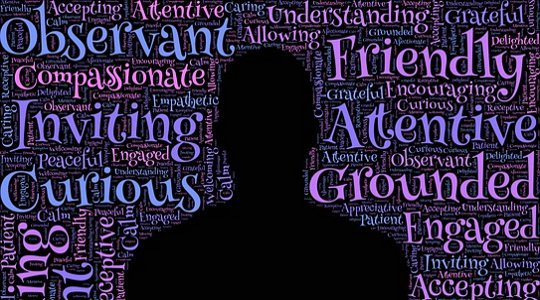
In adulthood we often see responsibility as something dreadful. Why should we dig the ground when the weather is disagreeable? We see activities only as obligations, and we strain against our fate. But there is a joy to working in harmony with the proper time. When we do things at just the right occasion and those efforts bear fruit later, the gratification is tremendous. -- Deng Ming-Dao -- 365 Tao Daily Meditations
If you grew up in a home where you were either neglected or constantly on the losing end of a win-lose situation, you will be trying to build responsiveness and responsibility in yourself at the same time that you try to maintain it in your household -- not an easy task by any means, but one you can handle.
Choosing to be Responsive
You can make the choice to turn your family dynamic toward health and spirituality. It's up to you. Look forward to it as a tremendous challenge and opportunity, as another important aspect of the path of parenting, if you choose to see it that way.
The foundation you lay now, even though you may slip back sometimes, will only grow stronger in the future. And just think: By the time you are a grandparent, this will all come much more naturally to you, so you can help your kids even more, and your grandchildren's foundation in these principles will be taken for granted by them.
When you leave this earth, it will be with the knowledge that through your struggle, you have changed generations of unhealthy, unskillful ways of being and have affected all the people that come within the circle of influence of your children, your grandchildren, and future progeny. That is quite a legacy.
The Key is Listening
The keystone is learning how to listen. As Steven Covey says, "Seek first to understand, then to be understood." This is difficult if, as many of us, you did not grow up with a model for effective listening. Most of the time, many of us just wait for the other person to finish talking so we can say what is on our own minds. The other person does the same, so conversations can be unsatisfying, and they may escalate into arguments because nobody is listening.
Listening involves all your senses, physical and spiritual. It means attending to the other person with your whole being, and responding to what she says genuinely and curiously. In order to feel heard, people need gentle eye contact (not glaring or staring). Turn off the television or other distractions; perhaps go into a room where just the two of you can talk. Pay close attention to the other person's cues -- whether it's your spouse, a friend, a parent, an employee, or your child. Notice their body language; downcast eyes or nervous gestures or a posture of defense often indicate shame, anger, or distrust. Don't expect children to meet your eye contact; it is too charged with power for them, and often they must look away. I remember all too well the parental chant of the fifties and sixties: "Look at me when I'm talking to you!" It was only said when the parent was lecturing or yelling at the child, so naturally eye contact became connected with fear, disempowerment, and shame.
Relax and slow down. It's okay if the person talking to you is angry or distressed -- it doesn't mean you have to feel that way too. When you're empowered, you want to understand how they feel and why, even if you or your words or actions may be the source of their distress.
This doesn't only apply to distressing situations. Cues will tell you the person really wants to be heard. Perhaps they had a great achievement or good news to share. Still, the need to be listened to is deep, and attending to that need is one of the greatest gifts you can give to another person.
Learning how to listen also involves learning how to feed back what you are hearing. The wrong way to do this is by parroting exactly what the person says. Everyone knows when a "technique" is being used on them, and almost everyone resents it. Your aim is to genuinely understand what that person is telling you, so you say things like, "So it sounds like what you're saying is. . . " and finish the sentence in your own words. They may say, "No! Not at all . . . " and go on to try to make themselves clear.
One of the worst things you can do is go on the defensive and correct or argue with them at this point. You can apologize for not understanding or for misunderstanding, and assure the person you really want to understand from their point of view, and that's why you are trying to repeat back what you think you are hearing. When you learn how to do this you'll find you've taken a giant step toward becoming a better parent, and a more empowered, grounded person.
Listening also involves your response to what you hear. Most of the time you want to keep your judgments and opinions out of your responses, unless they are asked for -- and even then, temper them with, "This may not be true for you, but. . . " or, "It's only my judgment off the top of my head but I think. . . " Most of the time you want to respond by saying things like:
* "That must have been painful."
* "Wow. That must be really hard to figure out."
* "I can see how excited you are about that! What an opportunity!"
You can also ask clarifying questions. This tells the person you really heard what they said and are genuinely interested in their thought process.
If you discover that the person's need is to communicate something you did or said that hurt them in some way, you need to relax and release your defensiveness. If necessary, pretend in your mind that it is someone else they are talking about, so you can really be there, to hear their pain and understand from their point of view what happened.
If you are the "culprit," your response has to be more than merely empathizing with how they feel -- if you do that, they will walk away feeling patronized or worse. You need to go deep within yourself to genuinely understand that, intentionally or not, you have broken trust with this person, and they need a genuine, eye-to-eye apology. In addition, you need to ask what you can do to make amends. And hugs don't hurt.
It doesn't matter if you believe they are right or wrong. If someone is hurt by what you say or do, that is a fact, and to practice this principle, you must express your remorse at the fact that they felt hurt. If you need to explain why you said or did what you did, how the hurt was unintentional or a misunderstanding, save it for later, or for when you are certain the other person has felt heard and understood, and that they are certain you are very sorry for hurting them. Begin with something like, "I'm not trying to excuse or justify hurting you, I'm still very sorry. But I want to make sure you understand where I was coming from when I did (or said) that."
If necessary, ask the person to feed back to you what they are hearing, so you are sure they aren't getting hurt all over again. If the end result of your listening session is not reunion, with everyone feeling better, with nothing hanging in the air, you need to go back, at another time, and try again. It takes time, especially if you have not seen them modeled, to develop the outward skills that demonstrate your innate, inward sensitivity toward others.
Responding vs. Reacting
The moment between stimulus and response is the precious moment when trust is built or broken. We need to train ourselves to pause in that moment, reflect, and respond rather than react to what is being done or said. Sometimes this means we need to take a time out for ourselves, to calm down, relax, and choose our response consciously, rather than reacting like we would to a bee sting or snake bite.
Chungliang Al Huang states, "One principle in the practice of Tai Chi is understanding that your energy will rebound naturally unless you interrupt." This principle, perhaps more than all the others, requires us to be grown-ups, to intentionally re-script ourselves to respond in a deep thinking, empathic way to the people around us -- even if we seem to be the only "grown-up" present in a room full of adults.
The great psychologist Carl Rogers said that the true communicator enables the other person to explore feelings and to mature. He was the first to describe the core conditions necessary for a positive, helping relationship. These include unconditional positive regard (respect), genuineness, and empathy (true understanding, from the other person's point of view).
Respect means you accept the other person as she is and you care about how she feels. She does not need to change in order to earn your respect.
Genuineness means you come across as a real, authentic person, not a "role." You are straightforward and sincere. You let people know who you are and what you stand for in ways that are kind and compassionate rather than judgmental or argumentative.
Empathy is the ability to feel what others feel and to accept others' experiences as valid. You can trust an empathic person with your feelings. An empathic person doesn't judge how you feel, tell you how you feel or should feel, analyze you, or gossip to others about your feelings told in confidence.
As adults we have the choice to move from childlike joy, wonder, and fun to adult reasoning, sensitivity, and the ability to set boundaries. Being fully responsive includes learning to easily and naturally move between these poles -- of our own volition, not because outside forces trigger it in us.
Being responsive is more than the ability to respond sensitively to your environment. It is the ability to take responsibility for your life, to refrain from blaming circumstances and other people for everything that happens in your life. This is also a "grown-up" principle to practice, because often it certainly appears that circumstances and other people are responsible for a lot of what happens to you. But you are responsible as well. The challenge is to take responsibility for your part in whatever happens, and to see the part of you that must change in order for the externals to change.
If you have been subjected to a lot of shame and blame in childhood, this principle may be difficult to master. There may be unconscious processes going on that you don't even understand that help create problems for you - still, putting the responsibility for them squarely on your own shoulders is the first step. The beauty of it is that you also get to release the things you are not responsible for to those who are. We are not responsible for the words and actions of our parents. Yet, we can only blame our parents for so long if we cannot control our temper. At some point, we have to take the responsibility to learn how to do it, and then to teach it to our children if it was not taught to us. The same principle applies in many other areas of life, physical, emotional, and spiritual.
Letting Go of Roles
One time when my child was four, he was waxing philosophical in the bathtub -- something about the bath brought out his spiritual nature -- and he asked me, "Mommy, do you know you have an inner ear?"
"Yes. . . " I thought maybe he had learned about the structure of the ear from a book or from Sesame Street.
"Where is it?" he asked. The way he eye-balled me and expected the correct answer reminded me of my spiritual teacher. I quietly said, "In your head?"
He looked at me with great compassion and wisdom, and a tinge of amusement, just like my teacher would have.
"No, silly, it's in your heart."
He went on to play with his rubber ducky like any other four-year-old as I sat in speechless wonder, taking in this ancient wisdom from my greatest teacher.
To listen to our children from our hearts, we have to let go, for the time being, of our roles of parent and mentor, and just be one being listening to the needs, opinions, or wisdom of another. Sometimes the greatest response is respectful silence, or to give the child feedback such as, "Sometimes you are so wise, it just blows me away."
Reprinted with permission (©1999) of the publisher,
New World Library, Novato, California, USA 94949.
www.newworldlibrary.com.
Article Source:
The Path of Parenting: Twelve Principles to Guide Your Journey
by Vimala McClure.
 The definition of "family" -- not to mention family structures and values -- is changing with lightning speed. Adults are seeking new meaning to guide them in their role as parents. This book offers 12 principles based on t'ai chi to make the experience both satisfying and enlightening.
The definition of "family" -- not to mention family structures and values -- is changing with lightning speed. Adults are seeking new meaning to guide them in their role as parents. This book offers 12 principles based on t'ai chi to make the experience both satisfying and enlightening.
For more info or to order this book:
https://www.amazon.com/exec/obidos/ASIN/1577310780/innerselfcom
About The Author
 Vimala McClure, internationally acclaimed author of The Tao of Motherhood and Infant Massage: A Handbook for Loving Parents, has been an avid student of Eastern wisdom all her adult life. She has studied, practiced and taught yoga and meditation for over twenty-eight years. For over a decade, she has studied the philosophy of Taoism and the martial art on which it is based, T'ai Chi. She is the founder of the Int'l Assn. for Infant Massage.
Vimala McClure, internationally acclaimed author of The Tao of Motherhood and Infant Massage: A Handbook for Loving Parents, has been an avid student of Eastern wisdom all her adult life. She has studied, practiced and taught yoga and meditation for over twenty-eight years. For over a decade, she has studied the philosophy of Taoism and the martial art on which it is based, T'ai Chi. She is the founder of the Int'l Assn. for Infant Massage.
Books by this Author:
at InnerSelf Market and Amazon























